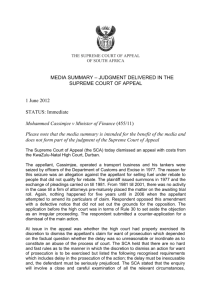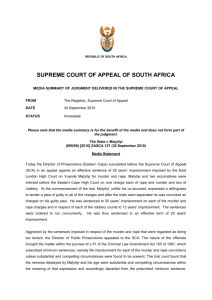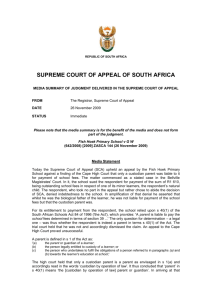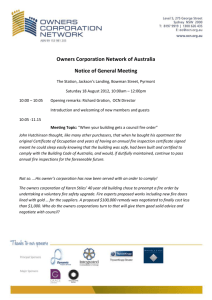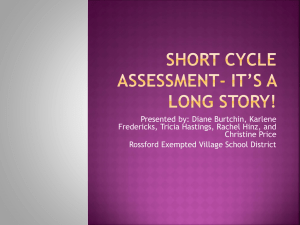Media Summary
advertisement
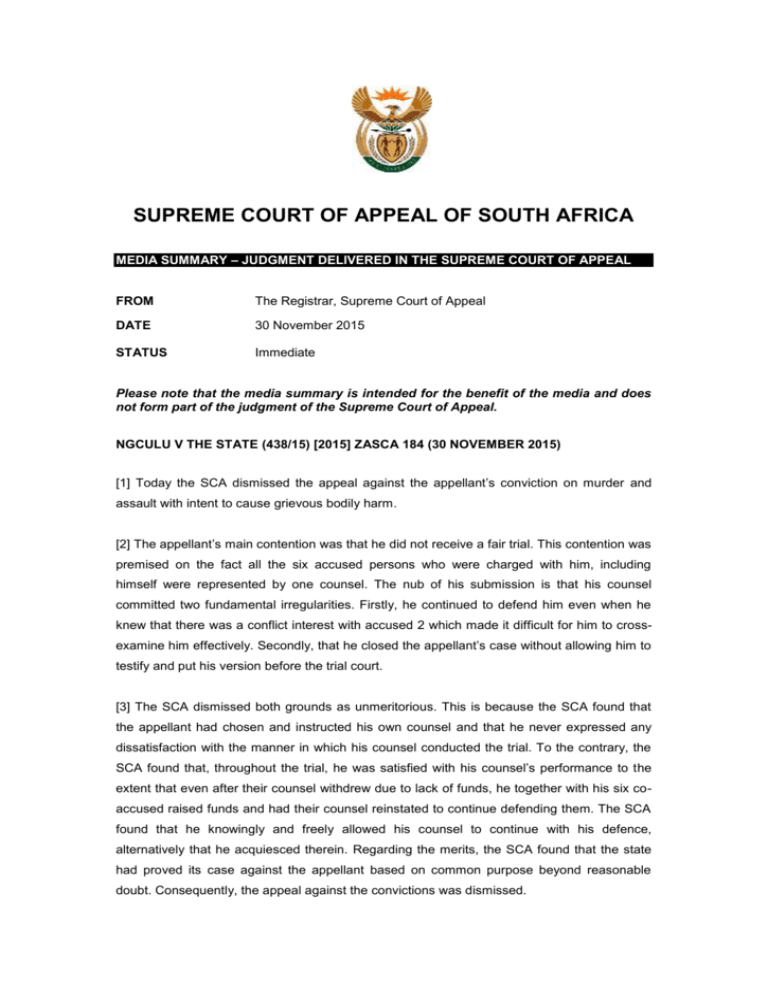
SUPREME COURT OF APPEAL OF SOUTH AFRICA MEDIA SUMMARY – JUDGMENT DELIVERED IN THE SUPREME COURT OF APPEAL FROM The Registrar, Supreme Court of Appeal DATE 30 November 2015 STATUS Immediate Please note that the media summary is intended for the benefit of the media and does not form part of the judgment of the Supreme Court of Appeal. NGCULU V THE STATE (438/15) [2015] ZASCA 184 (30 NOVEMBER 2015) [1] Today the SCA dismissed the appeal against the appellant’s conviction on murder and assault with intent to cause grievous bodily harm. [2] The appellant’s main contention was that he did not receive a fair trial. This contention was premised on the fact all the six accused persons who were charged with him, including himself were represented by one counsel. The nub of his submission is that his counsel committed two fundamental irregularities. Firstly, he continued to defend him even when he knew that there was a conflict interest with accused 2 which made it difficult for him to crossexamine him effectively. Secondly, that he closed the appellant’s case without allowing him to testify and put his version before the trial court. [3] The SCA dismissed both grounds as unmeritorious. This is because the SCA found that the appellant had chosen and instructed his own counsel and that he never expressed any dissatisfaction with the manner in which his counsel conducted the trial. To the contrary, the SCA found that, throughout the trial, he was satisfied with his counsel’s performance to the extent that even after their counsel withdrew due to lack of funds, he together with his six coaccused raised funds and had their counsel reinstated to continue defending them. The SCA found that he knowingly and freely allowed his counsel to continue with his defence, alternatively that he acquiesced therein. Regarding the merits, the SCA found that the state had proved its case against the appellant based on common purpose beyond reasonable doubt. Consequently, the appeal against the convictions was dismissed. 2 [4] Regarding the sentence, the SCA found, notwithstanding that this was an assault by a group which endured over a long period, that the court below erred by sentencing the appellant to life for murder in terms of s 51(1) of the Criminal Law Amendment Act 105 of 1997. The SCA found that the minimum sentence regime was not applicable as the appellant was never informed of its applicability either at the beginning of the trial or even during the trial. The SCA held that the sentence of life was in the circumstances inappropriate. Consequently, it set it aside and replaced it with imprisonment for 20 years. Regarding the 3 years’ imprisonment for assault with intent to cause grievous bodily harm, the SCA found the sentence to be appropriate. [6] In the result, the appeal against the convictions was dismissed. The appeal against sentence succeeded partly to the extent that the sentence of imprisonment for life in respect of murder was set aside and replaced with imprisonment for 20 years whilst the sentence of 3 years’ imprisonment for assault with intent to cause grievous bodily harm was confirmed. To ameliorate the severity of the cumulative sentence, the SCA ordered the 3 years’ imprisonment for assault with intent to cause grievous bodily harm to run concurrently with 20 years’ sentence for murder. The sentence was antedated to 22 September 2011. ---END---
